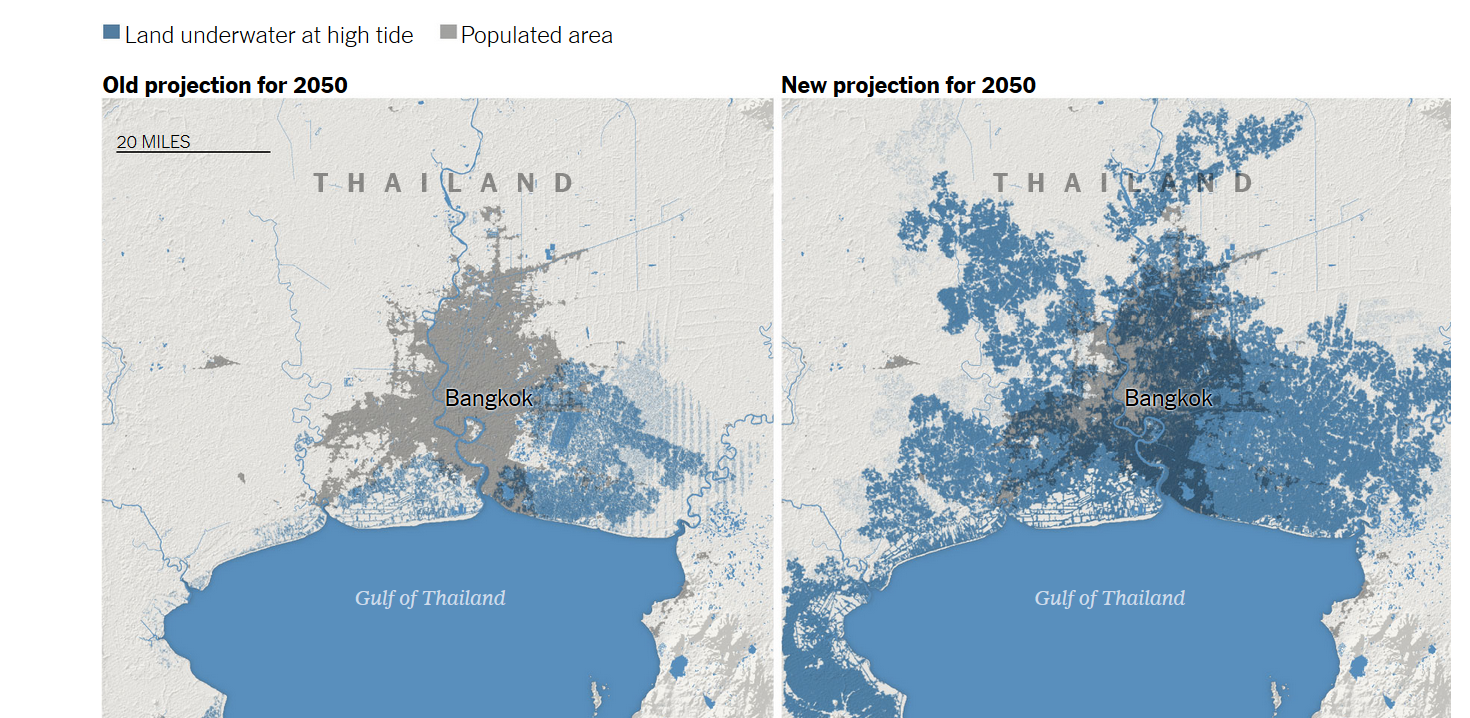
Major Coastal Cities Could be “Wiped Out” Within Decades Due to Climate Change
A new study released in Nature Communications argues that even under a moderate emissions scenario, projected sea levels are high enough to threaten the homes of nearly 150 million people by 2050.

NYT graphic of the research
As California burns from relentless wildfires, it is strange to be writing about water. And rising water at that.
Just as the ferocity and frequency of wildfires is forcing scientists to revaluate how our warming world is causing greater and more immediate impacts that many climate models had predicted, some scientists are revisiting other models on climate and projected sea level rise.
And what they have found is alarming them. Many more people are at risk than previously thought, potentially three times as many people.
At the moment some 20 million Californians are affected by the wildfires. In the midst of the fires, the local newspaper, the San Francisco Chronicle, raised the brutal, awful question that the fires had “intensified fears that parts of California had become almost too dangerous to inhabit.” It is the question many Californians will be asking right now.
But a larger disaster looms on the horizon. One that is getting closer every day. Within decades hundreds of millions of people could be under water across the globe. By 2050 many of the world’s low lying areas and cities could be flooded due to climate change. And it is going to get increasingly expensive to hold back the tide.
Writing in the peer reviewed journal, Nature Communications, scientists from Climate Central argue that even under a moderate emissions scenario “sea levels projected by 2050 are high enough to threaten land currently home to a total of 150 million people to a future permanently below the high-tide line”. Under a higher emissions scenario it could be 300 million people at risk.
But the effects will be felt worse in Asia than elsewhere.
As Climate Central notes: “The threat is concentrated in coastal Asia and could have profound economic and political consequences within the lifetimes of people alive today. Mainland China, Bangladesh, India, Vietnam, Indonesia, and Thailand are home to the most people on land projected to be below average annual coastal flood levels by 2050. Together, those six nations account for roughly 75 percent of the 300 million people on land facing the same vulnerability at midcentury.”
The New York Times, reporting on the findings, adds “Southern Vietnam could all but disappear… More than 20 million people in Vietnam, almost one-quarter of the population, live on land that will be inundated”.
The paper continues: “In Thailand, more than 10 percent of citizens now live on land that is likely to be inundated by 2050, compared with just 1 percent according to the earlier technique. The political and commercial capital, Bangkok, is particularly imperiled… The new projections suggest that much of Mumbai, India’s financial capital and one of the largest cities in the world, is at risk of being wiped out.”
Scott Kulp, the lead author of the study and a senior scientist at Climate Central, said: “These assessments show the potential of climate change to reshape cities, economies, coastlines and entire global regions within our lifetimes.”
He continued: “As the tideline rises higher than the ground people call home, nations will increasingly confront questions about whether, how much and how long coastal defenses can protect them.”
Co-author, Benjamin Strauss added “We’ve had a huge blind spot as to the degree of danger, and that’s what we’ve been striving to improve.”
Sea level rise will not only have a huge personal toll, but economic toll too. As Climate Central noted: “Some projections indicate that flooding could cause tens of trillions of dollars in losses each year by the end of the century – or trillions per year, if extensive adaptation measures are implemented.” Politicians remain blinkered by this blind spot too.
As one person noted on Twitter:
If the @GOP saw these maps, would they think “it’s a lie” or would they just think that saving civilization is not worth standing up to the fossil fuel lobby (including the Kochs)? Asking for a planet. #GreenNewDeal https://t.co/UwUOr7Mwj9
— Heather McGhee (@hmcghee) October 30, 2019
Meanwhile climate scientist, Peter Kalmus, tweeted in response to the research:
When I started speaking out on climate breakdown as a scientist, I was afraid of being labeled "alarmist." But I did it anyway to shift the culture. Especially among scientists.
Now I embrace the term. I'm here to sound the alarm. For good reason.https://t.co/lWPpFToCVV
— Peter Kalmus (@ClimateHuman) October 29, 2019
